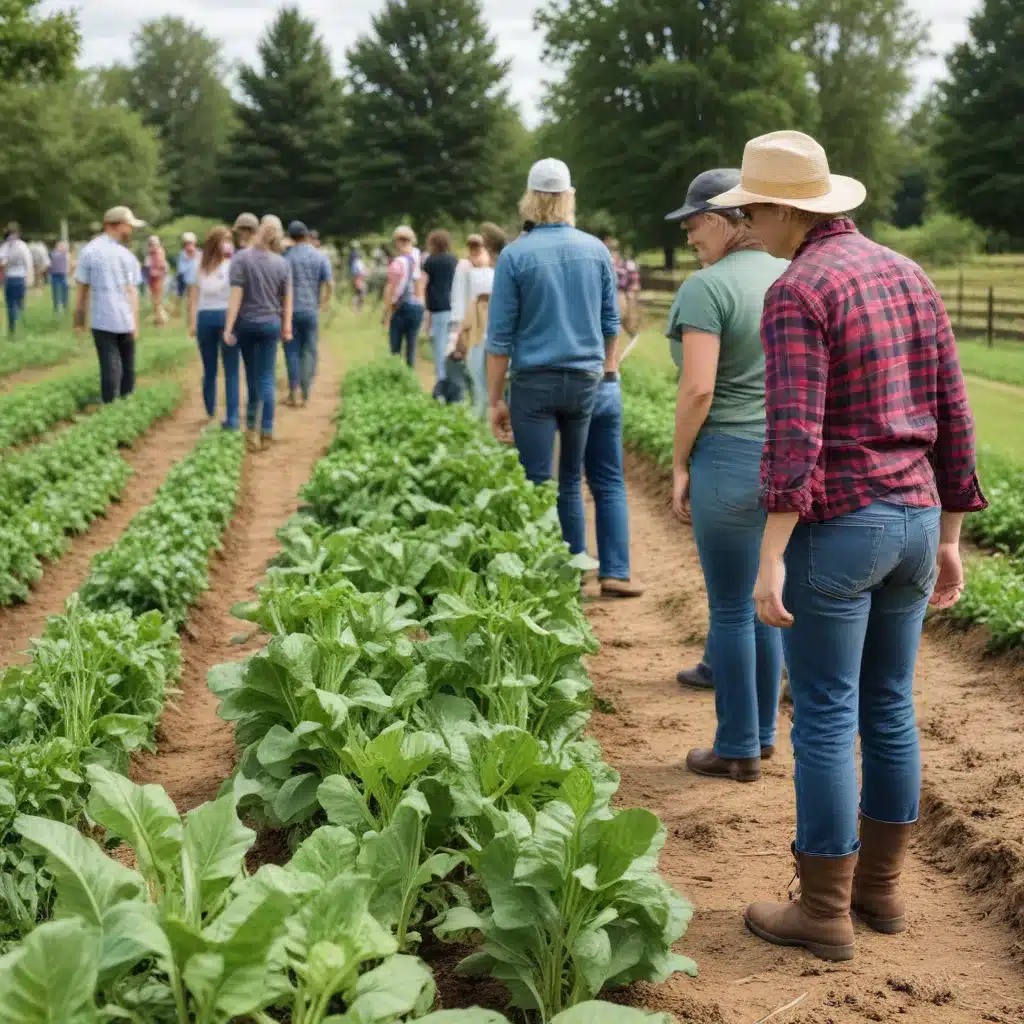
Crooked Pines Farm is excited to announce our upcoming “Exploring Sustainable Agriculture” event series, where we’ll delve into the world of regenerative farming, ecological stewardship, and community-driven agriculture. Through a combination of immersive farm tours and thought-provoking discussions, we invite you to join us in uncovering the innovative practices that are shaping the future of sustainable food production.
Organic Farming Methods
At the heart of sustainable agriculture lies the concept of organic farming. This holistic approach focuses on building healthy, living soils that can naturally support diverse plant and animal life. Through the implementation of techniques like cover cropping, integrated pest management, and the strategic use of renewable energy, organic farmers are able to minimize their environmental impact while still producing bountiful harvests.
One of the key tenets of organic farming is the management of soil health. By incorporating compost, vermicompost, and other organic amendments, farmers are able to enhance the soil’s ability to retain moisture, suppress plant diseases, and provide essential nutrients to their crops. This not only leads to more resilient and nutrient-dense produce, but also helps to sequester atmospheric carbon, mitigating the effects of climate change.
Complementing their soil-building practices, organic farmers also embrace integrated pest management strategies. Rather than relying solely on synthetic pesticides, they employ a combination of beneficial insects, row covers, and cultural controls to keep pests at bay. This approach not only protects the health of their crops, but also preserves the delicate balance of the farm’s ecosystem, nurturing a thriving population of pollinators and other beneficial organisms.
Regenerative Farming Techniques
Beyond the foundational principles of organic farming, our series will also explore the cutting-edge world of regenerative agriculture. This holistic approach goes a step further, aiming to not just sustain the land, but actively improve its ecological function over time.
One of the hallmarks of regenerative farming is the integration of agroforestry systems. By strategically incorporating perennial trees, shrubs, and herbaceous plants into their crop rotations, farmers are able to create diverse, multilayered ecosystems that mimic natural forest dynamics. These intricate systems not only enhance biodiversity but also provide a wealth of additional benefits, such as increased carbon sequestration, nutrient cycling, and improved water infiltration.
Another key regenerative practice is holistic land management, which involves the strategic integration of livestock into the farm’s operations. By carefully managing the grazing patterns of animals like cattle, sheep, and poultry, farmers can leverage the natural processes of trampling, manuring, and soil disturbance to enhance soil fertility and promote the growth of diverse grassland communities.
Farm Ecosystem Dynamics
Sustainable agriculture is not just about the crops and livestock; it’s also about nurturing the entire farm ecosystem. Throughout our series, we’ll explore the vital role that biodiversity plays in the health and resilience of agricultural systems.
One of the cornerstones of biodiversity conservation on the farm is the restoration and creation of wildlife habitats. This can involve the establishment of pollinator gardens, the planting of native hedgerows, and the strategic placement of brush piles and insect hotels to provide refuge for a wide range of beneficial organisms.
In addition to supporting diverse wildlife, sustainable farms also focus on nutrient cycling – the natural processes that transform waste products into valuable resources. Through the implementation of composting systems, vermiculture (worm farming), and precision nutrient application, farmers are able to minimize the need for external inputs while maintaining the fertility of their soils.
Community-Oriented Agriculture
Sustainable agriculture is not just about the land; it’s also about the people and communities that it serves. Throughout our series, we’ll explore the various ways in which farmers are connecting with their local communities to build resilient, equitable food systems.
One of the most vibrant examples of community-oriented agriculture is the rise of local food systems, such as farmers’ markets, community-supported agriculture (CSA) programs, and farm-to-table partnerships. These initiatives not only provide families with access to fresh, nutrient-rich produce, but also strengthen the bonds between growers and consumers, foster a sense of food sovereignty, and support the local economy.
Another important aspect of sustainable agriculture is the pursuit of sustainable livelihoods for farm families. This can involve strategies like farm succession planning, the adoption of cooperative business models, and the implementation of agricultural education programs that empower the next generation of farmers.
Future of Sustainable Farming
As we look to the future, it’s clear that sustainable agriculture will play a key role in addressing the pressing challenges of our time, from climate change and food security to ecosystem restoration and community resilience. Throughout our series, we’ll explore the innovative technologies and forward-thinking policies that are shaping the future of sustainable farming.
One of the most exciting frontiers in sustainable agriculture is the integration of precision farming technologies, such as GPS-guided tractors, drone-based monitoring, and sensor-driven irrigation systems. These cutting-edge tools not only improve the efficiency and productivity of farming operations, but also help to minimize the environmental impact of agricultural practices.
In addition to technological innovations, the future of sustainable agriculture will also be shaped by the power of policy and advocacy. Throughout our series, we’ll delve into the latest sustainable agriculture policies, explore meaningful farmer-scientist collaborations, and learn about the inspiring grassroots advocacy campaigns that are driving positive change in the industry.
Whether you’re a seasoned farmer, a passionate gardener, or simply someone who cares about the future of our food system, we invite you to join us on this journey of Exploring Sustainable Agriculture. Together, we’ll discover the transformative power of regenerative farming, the intricacies of farm ecosystems, and the vibrant community connections that are shaping the future of sustainable food production. We look forward to welcoming you to Crooked Pines Farm for this illuminating series of farm tours and discussions.


